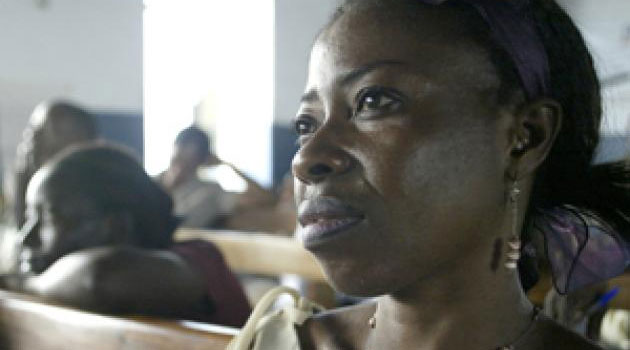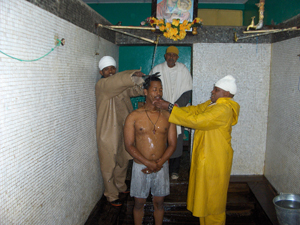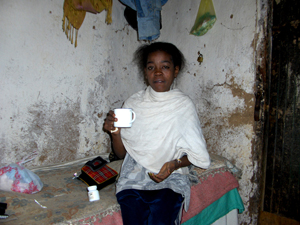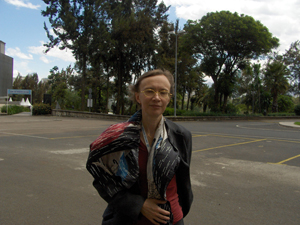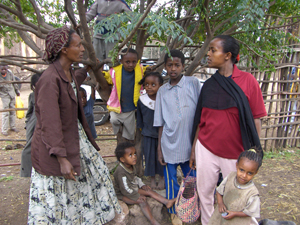Lagos, Nigeria — In Mushin, a threadbare suburb of Lagos, Hafsat Jamiu wipes away tears as she ponders the injustice of her fate. Through the window of her cramped, two-room apartment drifts the melodic voice of the muezzin summoning Muslims to prayer at the local mosque. Jamiu cannot hear the call. It is because of her HIV infection, which has left her hard of hearing.
Instead, as three younger children swarm around Jamiu’s frail frame, the eldest, an 8-year-old, puts his mouth to Jamiu’s ear and repeats a visitor’s questions loudly enough for her to comprehend.
Jamiu explains that she has lived all her life in purdah, or wearing the veil, and has remained chaste. She was a virgin when she married her husband, a Muslim scholar, and was faithful to him.
As it turned out, he was not as virtuous as Jamiu, and now she struggles not to be bitter. “I seek forgiveness from Allah,” she says. When she was pregnant with her two youngest, a twin boy and girl, the maternity clinic tested her for HIV — the practice in Lagos state — and discovered that she was infected. She is grateful, at least, that the twins were not.
As for her husband, he would never consent to being tested, but when he died five years ago, the doctor confirmed that the cause was HIV/AIDS.
Jamiu’s sad situation is all too common in Nigeria, the most populous nation in Africa and a society still deep in denial about HIV/AIDS. Despite Nigeria’s relatively low HIV/AIDS prevalence rate of 3.9 percent for people ages 15-49, because of its sheer size it has the third-largest HIV-positive population in the world.
Roughly 3 million Nigerians are infected with the virus, placing a staggering load on an already overburdened health care system. HIV-positive Nigerians still find themselves stigmatized and shunned, and a vast segment of the population remains ignorant of basic information about how to avoid infection.
Worse yet, dangerous practices — including sex work, polygamy and female genital mutilation — put vast numbers of Nigerians at risk.
Not surprisingly, Nigeria has been designated by the Bush administration as one of the 15 “focus countries” for the President’s Emergency Plan for AIDS Relief, or PEPFAR, the five-year, $15 billion effort to combat HIV/AIDS around the world. Of the $110.2 million that PEPFAR spent in Nigeria in 2005, most went toward desperately needed antiretroviral (ARV) drug treatments and health care for HIV-positive Nigerians. Antiretroviral drugs are credited with transforming HIV/AIDS from a fatal condition to a manageable illness.
But PEPFAR’s $21 million prevention effort in Nigeria is more problematic. Few of the faith-based organizations involved in the effort are Islamic — despite the fact that 50 percent of Nigerians are Muslim. And while PEPFAR’s ideological preference for abstinence and faithfulness over condom use for prevention meets with approval from Muslim as well as Christian leaders, it does little to protect women like Hafsat Jamiu, whose male partners’ infidelities endanger their lives.
In a speech in July, President Olusegun Obasanjo touted Nigeria’s success in fighting HIV/AIDS, citing government surveys showing that the HIV infection rate among pregnant women at maternity clinics has fallen in recent years, from a national average of 5.8 percent in 2001 to 4.4 percent in 2005. Even so, he admitted, some parts of Nigeria — such as Iquita-Oron, a rural area in Akwa-Ibom state, which reported an alarming 14.4 percent antenatal HIV rate — had significantly higher rates. And some experts question whether the Nigerian government’s seemingly encouraging data really is accurate.
“I don’t think these figures very accurately reflect the situation on the ground,” UNICEF’s Joshua Emmanuel, project officer on HIV/ AIDS, based in Abuja, told a U.N. news service in September. “I think we are seeing only the tip of the iceberg.”
Indeed, a 2002 report by the U.S. National Intelligence Council estimated that HIV prevalence in Nigeria might actually be as high as 10 percent. The NIC painted an exceedingly grim picture of Nigeria’s future.
“Given the already advanced state of the disease and the government’s limited capacity to respond, we expect HIV/AIDS to infect as many as 10 to 15 million people by 2010,” the report concluded. “This number would constitute roughly 18 to 26 percent of adults — close to the current rates in some of the hardest-hit countries in southern Africa.”
Young Nigerians are endangered when they engage in high-risk behavior. According to the Joint United Nations Program on HIV/AIDS (UNAIDS), 78 percent of men and 29 percent of women in Nigeria ages 15 to 24 have had sex with a casual partner in the past 12 months.
Not only that, but they’re seldom taking precautions — only 46 percent of men in that age group used condoms in their casual sexual encounters, and just 21 percent of men and 18 percent of women in that age group can identify the ways HIV can be prevented.
It would appear that many live in denial. A truck driver from Ikeja, for example, told a writer for the Nigerian Web sitewww.nigeriahivinfo.com that he has two wives at home and three other sexual partners as well but that he never uses condoms because he doesn’t like them. Despite all that high-risk sexual activity, the truck driver didn’t worry about becoming infected with HIV. “As you see me, do I look like an AIDS patient?” he asked.
Sex with multiple partners is pervasive in Nigeria. In a 2000 adolescent health study, 41 percent of high school students said that they came from polygamous families. According to the study, 30 to 50 percent of adults in Nigeria reported current or past polygamy.
Another problem that may contribute to the spread of HIV/AIDS is female genital mutilation. One study estimated that 19 to 25 percent of Nigerian women are subjected to the procedure, usually at a young age. A paper presented at the International AIDS Conference in Bangkok, Thailand, in 2004 estimated that 50 percent of Nigerian women undergo the cutting and documented the case of a 6-year-old Nigerian girl who became infected with HIV as a result of the practice.
In July, Hajia Memunia Yakub Mohammed, director of coordination and support programs for the Nigerian National Action Committee on AIDS (NACA), complained to the Nigerian newspaper This Day that most Nigerians aren’t taking prevention messages to heart. “Nigerians are yet to come to terms with the ugly consequences of the disease,” he said. “We have not imbibed the lessons, nor seen the reason to change our bad habits which fuel the spread of HIV.”
In addition to Nigerian society not grappling with preventing HIV/AIDS, the country has been slower than others to respond to the threat of HIV/AIDS. According to a 2004 study funded by the U.S. Agency for International Development (USAID), it was not until 1999 that the Nigerian government began serious efforts to fight the epidemic, establishing national and state action committees.
In 2001, the Nigerian government announced that it would spend $3.7 million annually to import antiretroviral drugs, and it began setting up a government-run treatment program with 25 centers around the country. In 2004, about 13,000 HIV-positive Nigerians were receiving treatment. But as the USAID-funded study noted, the government treatment system has been plagued by problems, ranging from budget shortfalls to inadequate centralized management of drug inventories.
A bigger problem was that the government expected patients to cover 40 percent of the cost of ARV drugs and testing, or about $27 per month. In a country where 71 percent of the population must survive on less than $1 a day, the cost of the treatment is beyond the reach of most of those with HIV/AIDS.
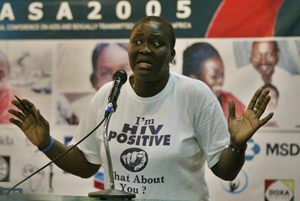
More recently, the Nigerian government embarked upon an ambitious new program to supply 250,000 HIV-positive Nigerians with ARV drugs free of charge. According to newspaper reports, however, the effort became so bogged down in bureaucratic inefficiency that by mid-2006, only 60,000 people were getting the treatments they needed to stay alive.
When HIV-positive Nigerians try to get medical care, they often face mistreatment and discrimination. A study published in 2006 by Physicians for Human Rights, a U.S.-based nongovernmental organization (NGO), found that 11 percent of HIV-positive Nigerians reported that they had been refused health care, and a similar number said that hospitals had isolated them from other patients, as if their infection could be spread by contact. Sixty-one percent said that doctors and nurses put on extra gloves and other protective gear before treating them.
Roughly one in five Nigerian health care professionals opined that many of those who contracted HIV/AIDS had engaged in immoral behavior and deserved the disease.
Rifkatu Cayford, senior counselor on HIV/AIDS at the National Hospital in Abuja, told This Day in July that Nigerians with HIV/AIDS often try to conceal their condition by traveling to distant states to seek treatment, out of fear that they will be ostracized or mocked at home. “But you still find that people [in Nigeria] still discriminate against people living with the virus because of fear,” she said.
According to the U.S. State Department’s Office of the Global AIDS Coordinator (OGAC), roughly half the $110.2 million that PEPFAR spent in Nigeria in fiscal 2005, or $53.8 million, went to antiretroviral drug treatments for about 28,500 Nigerians, while $19.1 million helped provide basic health care to ease the suffering of people with HIV/AIDS. An additional $21.1 million went to prevention efforts.
Of the $21.1 million spent on prevention, programs aiming to prevent mother-to-child transmission garnered $5 million (24 percent), while $4.1 million went to curb infections from tainted needles in hospitals and clinics, and $3.5 million (17 percent) was allotted for improving the safety of Nigeria’s blood supply.
That same year, PEPFAR spent the least amount of prevention money — $2.6 million, or 12 percent — on distribution of condoms and efforts to promote their use. The promotion programs funded by PEPFAR distributed 3.2 million condoms to Nigerians identified as high risk, such as sex workers and their clients.
The biggest slice of PEPFAR prevention spending — $6 million, or about 28 percent — went toward programs that promote the “Abstinence” and “Be Faithful” components of the Abstinence, Be Faithful, and correct and consistent Condom use, or so-called ABC, approach to prevention. But despite that outlay, relatively few Nigerians are getting the message.
In 2005, according to OGAC, PEPFAR-funded community outreach programs communicated the importance of abstinence and faithfulness to 1.9 million Nigerians — less than 2 percent of Nigeria’s population of 131.5 million.
One PEPFAR-funded project is the Zip Up abstinence campaign developed by NACA and the Society for Family Health, an NGO. The campaign, which started in 2004, has included TV ads, radio spots, billboards, T-shirts and caps emblazoned with the “Zip Up” slogan, and the distribution of wallet-sized cards with scripted questions and answers that men or women can use to negotiate not having sex. (A sample: “Q: Why won’t you have sex if you love me?” A: “My love’s based on respect, not sex.”)
The media campaign is reinforced by seminars held by faith-based groups. Zip Up’s proponents cite survey data showing that between 2003 and 2005, the median age at which women had their first sexual experience rose from 16.8 to 17.6 years old.
“Our culture is very hostile to condom use,” said Yemi Osilaja, executive director of Hope worldwide Nigeria, which receives PEPFAR funding to run an HIV/AIDS prevention program for youth. “For that reason, it makes a lot of sense to talk about abstinence. We tell them to abstain from sex until they are old enough for marriage, and thereafter remain faithful.”
PEPFAR has emphasized working with faith-based organizations, and Nigeria is no exception. But despite the high proportion of Muslims, most of the faith-based organizations working with PEPFAR are Christian. Of the PEPFAR sub-partners listed on the U.S. State Department Web site for Nigeria, most appear to have Christian religious affiliations, including such organizations as the Redeemed Evangelical Mission, the Christian Health Association of Nigeria and the Catholic Secretariat of Nigeria.
In comparison, only two of the Nigerian faith-based groups listed in PEPFAR documents — the Muslim Action Guide Against AIDS, Poverty, Illiteracy and Conflict (MAGA) and the Muslim Sisters Organisation — seem to be Islamic. (Both are sub-partners of Family Health International, a U.S.-based NGO that received $29 million in PEPFAR funding in 2005.)
MAGA’s prevention activities include an HIV/AIDS awareness campaign for Muslim youth in the Mushin, Agege, Mosan-Okunola, Ayobo-Ipaja and Lagos Island areas of Lagos state. The group has organized training workshops for local Muslim clerics to teach them how to spread MAGA’s primary prevention message — that abstinence and marital fidelity are the best protection against contracting the disease.
“Our primary aim is to enlighten our people and add the Islamic values to the knowledge and counseling about the disease,” said Abdulsalam Adetokunbo, program manager for MAGA. “We can counsel people in the areas of faithfulness and abstinence, which are the focus of PEPFAR.”

Before MAGA began its work a year ago, Adetokunbo said that some Nigerian Muslims refused to go to Christian organizations for HIV testing or counseling. “Some of them believe that Christians do not like them, therefore they could be injected with the virus,” he said. “We are Muslims, and they trust us to give them correct information and attention. We meet with those who are in purdah and they are ready to speak with us. Some of them ask us to give them the address of our center because they feel that they do not want to go to kafiris [unbelievers] for treatment.”
Adetokunbo admits that MAGA’s appeal to Muslims’ virtuosity doesn’t always work. “Even in the time of the prophet, 1,500 years ago, people fornicated. What about now? There are cases of people who fornicate. How do you stop this? You say ‘be faithful’, but if you fail to be faithful you can use a condom. We don’t preach it openly, but we say it among scholars to help those we counsel. There is the case of a widow whose husband died recently. He died of AIDS, but the wife never knew. It was on his dying bed that she knew. The wife is in purdah, we advised her to go for test and she went and found out that she is [HIV-]positive. She is now living with HIV/AIDS. There are two or three of such cases that we have now. We now take them to the group they belong to and say, ‘Well, you said AIDS is not real. Now you have a member living with it, so what do we do?'”
But many Christian churches and organizations in Nigeria take a more unyielding position. In January, Cardinal Anthony Okogie, the leader of the Catholic Archdiocese of Lagos, condemned a proposed government effort to manufacture condoms, telling This Day that the effort would “encourage immorality, sex on demand, promiscuity, irresponsibility and prostitution.”
Brown University anthropologist Daniel Jordan Smith, who has studied the intersection of religion and HIV/AIDS, noted in a 2004 scholarly article that many Nigerian evangelical pastors view HIV/AIDS not as a health problem, but as the result of immorality. In his visits to Nigerian church services, Smith saw HIV-positive converts encouraged to testify about having led sinful lives before accepting Christ and he even heard stories of HIV/AIDS being cured through faith healing.
“[T]he larger religious message that HIV/AIDS is the result of immorality and can be prevented by being a good, moral Christian contributes to a social environment in which the disease is highly stigmatized,” he wrote.
At the Redeemed Action Program Against AIDS (RAPAC), a PEPFAR-funded organization that is part of the Redeemed Christian Church of God, peer education programs for men, women and youth focus almost exclusively upon the “Abstinence” and “Be Faithful” components of the ABC approach to HIV/AIDS prevention. “We are a bit silent about the ‘C’ part, because we do not want to be seen as supporting or preaching the use of condoms,” said program manager Laide Adenuga. “You cannot be telling people to abstain and still be giving them a condom on the other hand.” Condom use is discussed only with couples in which one partner is infected with HIV — but only if they request it, she said.
But while the abstinence-and-fidelity style of prevention that PEPFAR favors is approved of by Nigerian religious groups, some question whether it is the best approach in a country where alarming numbers of people — including those who are religious — engage in sexual behavior that puts them at risk of contracting HIV.
In his article, anthropologist Smith cited the example of a 23-year-old hairdresser’s apprentice in the Nigerian city of Kano, who said religious faith was the reason she didn’t insist that her boyfriend use a condom when they had sex. “I met my boyfriend in church,” the woman told Smith. “We are both children of God, and I know I can trust him. I only have sex with him because I love him and I know that he is only with me. I protect myself from pregnancy [using the pill], but I know he will not give me AIDS.”
In August, Peter Ebigbo, deputy vice chancellor of the University of Nigeria, called upon faith-based organizations to consider advocating condom use, instead of merely preaching abstinence, and asked them not to see HIV/AIDS as “a disease brought by God’s anger.”
“In view of the alarming prevalence of HIV/AIDS among young people who get older and older before marriage, and become more and more involved in relationship before marriage, let massive ministering and advocacy be accompanied by the possibility of the use of condom, and let the rest be left to the person and his or her conscience, since we cannot change our faith because we want to prevent somebody from dying,” Ebigbo said.
But so far, Ebigbo’s plea seems to have had little impact. Meanwhile, back in Mushin, Hafsat Jamiu’s life is increasingly hard. As often happens to those with HIV in Nigeria, she has been shunned and abandoned by her relatives, left to support her four children on whatever she can earn as a seamstress. But Jamiu’s sewing machine has grown old and is broken, and she cannot afford to have it repaired, so lately she has been unable to work. She worries about what would happen to her children if her health deteriorates further. Already, her eldest sometimes has to miss school, because she needs him to escort her to the hospital where she gets her antiretroviral medication. How will he get an education? And though she diligently takes the drugs that might prolong her life, what will happen to her family if she does become ill? Seeking forgiveness from Allah is all she feels she can do.
